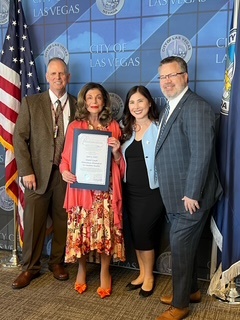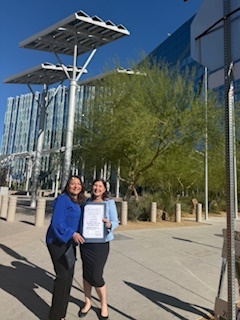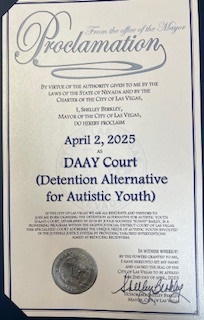April is world autism month. In honor of world autism day, Mayor Shelly Berkley presented a Proclamation to Judge Sunny Bailey and the community partners who make DAAY Court successful. DAAY is short for detention alternative for autistic youth. It is a model court that is breaking ground and charting territory for other courts around the country to learn from and follow.
Judge Bailey expressed gratitude to Mayor Berkley and to the community partners who make DAAY Court successful for their commitment to DAAY Court and the youth of Clark County.
The CDC reports that one in 31 children in the U.S. has autism and one in 45 adults in the U.S. has autism. A CDC report outlines: Autism spectrum disorder (ASD) is a developmental disability characterized by difficulties with social interaction or communication and the presence of restricted interests or repetitive behaviors. ASD is recognized as a heterogenous condition with wide variation in the type and severity of signs, symptoms, and levels of support needed among persons with ASD.
Judge Bailey understands what the parents of children with autism go through, because she has been through it herself. One of her own children was diagnosed with autism. More than 20 years ago, she moved from Washington for a well-respected autism program in Las Vegas for her own child. That’s when she began her journey to train and practice ABA to help her daughter to go from 250 aggressive acts a day, to one every several months.
She understands the challenges that parents have to hold down jobs, deal with issues at school, and ensure that other children in their family get the attention they need. There are difficulties getting into training and getting insurance coverage. She knows how daunting the paperwork for individual education plans (IEP) can be. If youth don’t have a proper IEP that covers their behaviors, they can be expelled.
DAAY court involves a lot of coordination and moving pieces. Judge Bailey says that you have to start young. Early intervention can help youth to adapt to the mainstream. Judge Bailey describes the coming together of DAAY court like a “Suave hair commercial.” “I had a separate calendar for one kid with a battery DV with no services. I knew some people who could help with services; then I had another kid.” She explains the service providers kept showing up and kids kept being referred. “It just got bigger, bigger and bigger; and a year later we figured we’d better have a name.” They settled on detention alternative for autistic youth commonly known as DAAY.
Nevada State Senator James Ohrenschall introduced Senate Bill 411 that is intended to establish that “with certain exceptions, existing law grants the juvenile court exclusive jurisdiction over a child who is alleged or adjudicated to have committed a delinquent act. In general, under existing law, a child commits a delinquent act if the child commits an act designated as a criminal offense. (NRS 62B.330) Section 4 1 of this bill requires the juvenile court to establish an appropriate program for the treatment of children diagnosed with or suspected to have autism spectrum disorders to which it may assign a child who is alleged or adjudicated to have committed a delinquent act.”
At a hearing for SB411 Nevada Senate Judiciary Committee Judge Baily said, “Although aggression is not a symptom of autism, youth with autism sometimes behave aggressively towards themselves or to other people. This can lead to charges for battery on protected persons, battery domestic violence, threats to teachers, first responders, medical personnel and the public.” Judge Bailey described the DAAY court to the committee as, “a program for youth involved in the juvenile justice system with a primary diagnosis of autism. The goal and function of DAAY court is, simply put, to increase the skills and appropriate behavior of youth with autism. The program is designed to address the lack of services and to address the proper programs and services to prevent future illegal behaviors especially aggressive violent behaviors.” She punctuates the importance of the program’s success, “The alternative to this program is that kids end up in juvenile detention and ultimately when they are older going to jail.”







